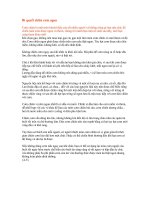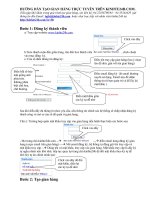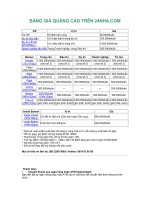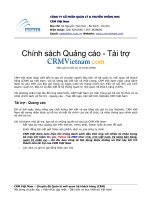Com EXPORT DOCUMENTS 1
Bạn đang xem bản rút gọn của tài liệu. Xem và tải ngay bản đầy đủ của tài liệu tại đây (65.82 KB, 6 trang )
Lac Hong University
Đỗ Thị Lan Đài
Export Documents
Shipping and receiving country requirements, in terms of sale and method of payment,
typically dictate the required export documents. Exporters must prepare all documents
with absolute accuracy. Therefore, new exporters should consider obtaining the advice
and securing the services of a competent freight forwarder, in order to ensure compliance
with all necessary documentary requirements. Your freight forwarder can be an
invaluable source of information on markets, packing, and shipping costs, as well as
documentation for export transactions.
Airway Bill
The airway bill, a non-negotiable instrument, serves as a receipt for the shipper. Issued by
the airline or consolidator, the AWB indicates that the carrier has accepted the listed
goods and obligates itself to carry the consignment to the airport of destination, in
accordance with the conditions listed on back of the original bill. In addition, the AWB
serves as documentary evidence of the conclusion of the contract of carriage, freight bills,
certificates of insurance, the customs declaration. The waybill is a guide to carrier's staff
in handling, dispatching and delivering the shipments.
Certificate of Inspection
Many foreign firms require this document for protection in quality and conformity
disputes with the shipper. The document, typically in the form of an affidavit from either
the shipper or an independent inspection firm, certifies the quality, quantity and
conformity of the goods to the purchase order.
Certificate of Insurance
English in Foreign Trade
1
Lac Hong University
Đỗ Thị Lan Đài
A qualified insurance broker issues a Certificate of Insurance on behalf of the shipper.
The shipper provides this document and/or instructions referenced in the letter of credit
whenever Letter of Credit or Documentary procedures require him to provide evidence of
risk coverage for merchandise shipped. Most freight forwarders have a blanket policy
available and can issue the certificate on behalf of customers.
Certificate of Origin
This document certifies that goods were manufactured in the United States. The shipper
must sign the certificate, and when required, an accredited chamber of commerce or trade
bureau must certify it. Sometimes it must also be sent to a consulate for endorsement.
This document must be signed by the exporter (or his representative such as a forwarder),
notarized and then signed by a chamber of commerce before presenting it to the consular.
Commercial Invoice
Normally, exporters use the same invoice for both domestic and international trade.
However, some countries require special forms. The invoice must include the dates of
billing and shipping, names of exporter or manufacturer, consignee, terms of sale, mode
of payment, description of goods, packing marks and numbers, numbers of units, price
per unit, total price, transportation mode and any other information required by the
country of destination.
Forwarder's Export Invoice
The forwarder generally pays all third party charges such as inland freight, port charges,
insurance, air/ocean freight, consular charges, messenger fees, etc., and bills the shipper
for all of these charges under one invoice, the "Forwarder's Invoice." Supporting
documents back up this invoice.
English in Foreign Trade
2
Lac Hong University
Đỗ Thị Lan Đài
Letter of Credit
The importer's bank issues this financial instrument to the supplier. In this document, the
opening bank substitutes its own credit for that of the importer and undertakes a
commitment to a designated beneficiary (the exporter) to pay a stated amount within a
stated time frame. The exporter must comply with all of the terms and conditions of the
letter of credit for the provision mentioned above to hold.
Loss and Damage Claim
Exporters use this form to claim insurance compensation for goods lost or damaged
during exportation. The claim must fully describe lost items and supporting documents,
such as copies of the commercial invoice, bill of lading and insurance certificate.
Ocean Bill of Lading
The ocean bill of lading serves as a document of title, a contract of carriage between the
steamship company and the shipper, and a receipt for goods given by the steamship
company to the shipper. The bill of lading confirms where to deliver the goods, how
freight charges will be paid, and to whom the goods are consigned. The bill of lading
spells out all legal responsibilities and liability limits for all parties to the shipment. Since
an original bill of lading is a negotiable instrument (copies are not), the shipper/exporter
may want to prepare it in such a way that he can retain title to the goods. In addition, the
shipper/exporter should find out whether the destination country requires specific
wording on the OB/L before filling it out.
Two types of bills of lading exist. The shipper uses the first type, non-negotiable ''straight
bills," when consigning the shipment directly to the final buyer. Meanwhile, the shipper
uses the second type, negotiable "order bills," when he does not want title to pass to the
English in Foreign Trade
3
Lac Hong University
Đỗ Thị Lan Đài
buyer until certain conditions have been met. In this instance, the specified shipper must
endorse the bill of lading before delivery can occur. An order bill of lading must also
show the party to be notified at destination.
Order bills of lading play an important part in international transactions, especially when
dealing with letters of credit and drafts. Most letters of credit call for "on board" bills of
lading, which provide proof to the buyer that the shipment has been placed on board the
vessel.
Packing List
Customs officials use this list to check cargo, while buyers use it to inventory
merchandise received. The packing list describes all items in the box, crate, pallet, or
container, plus the type, dimensions, and weight of the container.
Power of Attorney
Exporters give freight forwarders and customs brokers the right to act as their agents with
this document.
Pro Forma Invoice
The buyer uses this document when he applies for importation, and if required, for a
letter of credit. Therefore, it is important that the invoice include all the necessary
information for an import application, that it reflects your product in a very precise
manner, and that it includes every conceivable cost you might have to bear.
In order to create a pro forma invoice, you need to know:
1. Equipment/items that the customer desires, and its value, weight, and cubic dimensions
of the shipment.
English in Foreign Trade
4
Lac Hong University
Đỗ Thị Lan Đài
2. By what means the equipment is going to be shipped. Your forwarder will help you
determine the charges for the freight, insurance premium charges, legalization charges
(depending upon the country), and the cost for handling the letter of credit. If inland
transportation is involved, he can figure those rates as well.
3. Packing method: crates, pallets, or containers.
4. Where the equipment will be landed.
Shipper's Export Declaration
This form must be prepared for every shipment that goes beyond the borders of the
United States, with the following exceptions: a) shipments to the possessions of the
United States; excluding Puerto Rico, b) shipments valued at less than U.S. $2500.00.
Forms may be obtained from the field offices of the U.S. Department of Commerce,
freight forwarders, or the Government Printing Office. The "export declaration" must be
prepared in full, signed by an officer of the export company (power of attorney may be
issued to permit signing by another employee or by an independent freight forwarder),
and is generally prepared in quadruplicate. Steamship companies and airlines must attach
a copy of every export declaration to the ship's manifest and file with the U.S.
Department of Customs before clearance is issued. The "export declaration" is used for
export control and for export statistics and should never be sent outside of the United
States. The shipper export declaration includes a listing of the products shipped by
Schedule B number, otherwise known as Harmonized System or HS codes. These
numbers are important because they are the means by which governments levy tariffs and
otherwise control trade.
Shipper's Letter of Instruction
English in Foreign Trade
5
Lac Hong University
Đỗ Thị Lan Đài
The importance of the shipper furnishing the freight forwarder with clear, precise
instructions cannot be stressed enough. Remember that the forwarder is an extension of
your export department. He needs to know as much about the transaction as you do so
that he can comply with all of your customer's requirements. Failure to furnish the
forwarder with accurate shipping instructions can create unnecessary problems, some of
which are listed below:
1. Failure to collect against a letter of credit because the forwarder was unaware that there
was a letter of credit involved.
2. Failure to insure the shipment.
3. Forwarder shipping of freight prepaid instead of collect.
4. Failure to prepare certain documents called for on the letter of credit, thinking that the
shipper would prepare them.
5. Returning of original documents to the shipper for him to distribute them, instead of
sending them to a bank and/or consignee.
Transmittal Letter
This document is prepared with a bank draft and used to send shipping documents to a
remitting bank for processing either a collection or payment/negotiation under a letter of
credit. Shippers include their precise and complete instructions concerning how
documents should be handled and payments remitted in the transmittal letter.
English in Foreign Trade
6









